LIFE CALLING AND PURPOSE: Professionalism and Ethics
VerifiedAdded on 2023/03/30
|8
|1665
|323
Essay
AI Summary
This essay delves into the concepts of life calling and purpose, contrasting vocation and career, and emphasizing the significance of vocational professionalism and ethics. It explores the characteristics of a professional, including respect, responsibility, and adherence to ethical norms, such as individual, positive, and legal morality. The essay also examines the impact of wealth on professionalism and the importance of financial planning. Moreover, it defines a meaningful life, highlighting the importance of happiness, purpose, social and physical well-being, and the sense of belonging. The author emphasizes that a true calling brings contentment and fulfillment, making the job not just a career but a vocation, and stresses the importance of maintaining professionalism and ethical practices to achieve a fulfilling and impactful life.
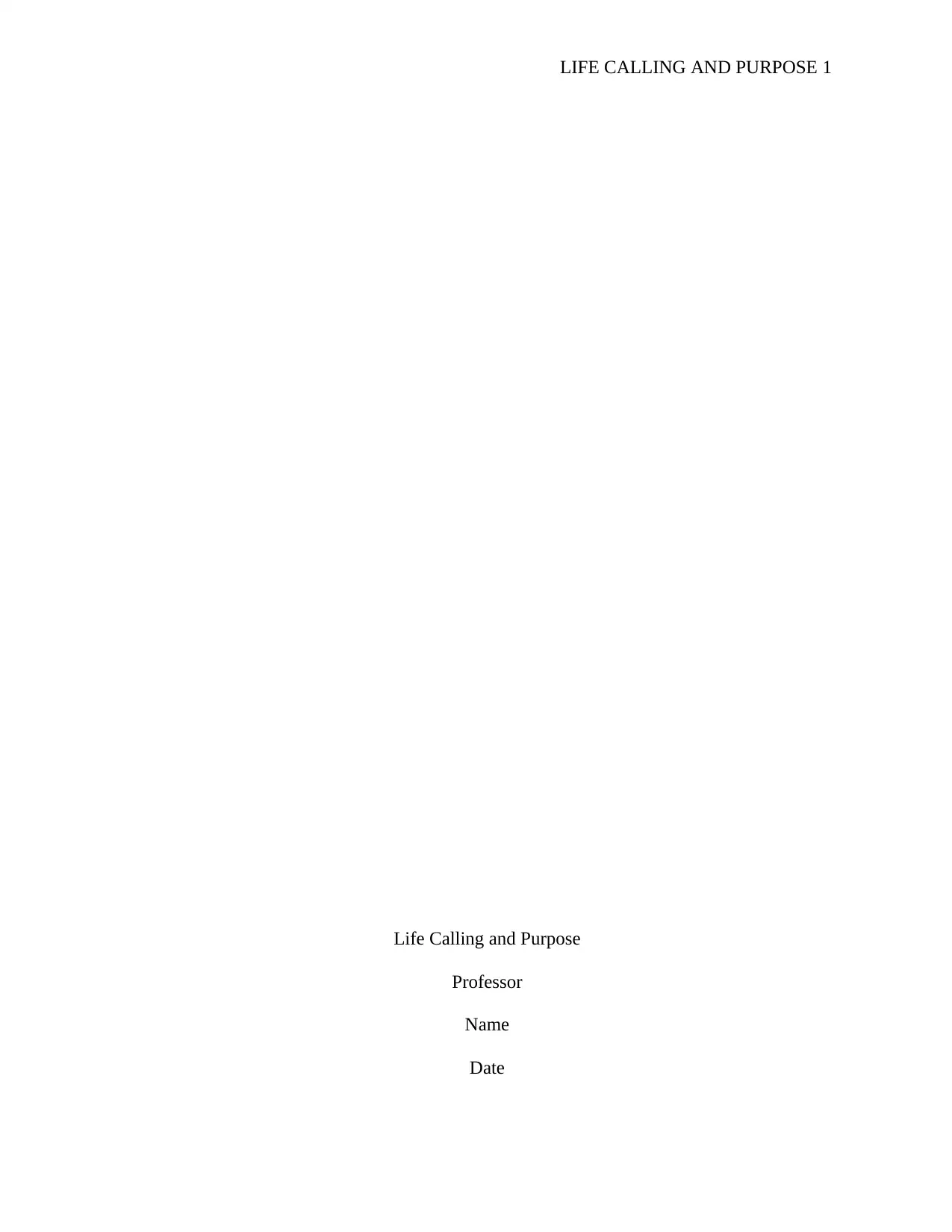
LIFE CALLING AND PURPOSE 1
Life Calling and Purpose
Professor
Name
Date
Life Calling and Purpose
Professor
Name
Date
Paraphrase This Document
Need a fresh take? Get an instant paraphrase of this document with our AI Paraphraser
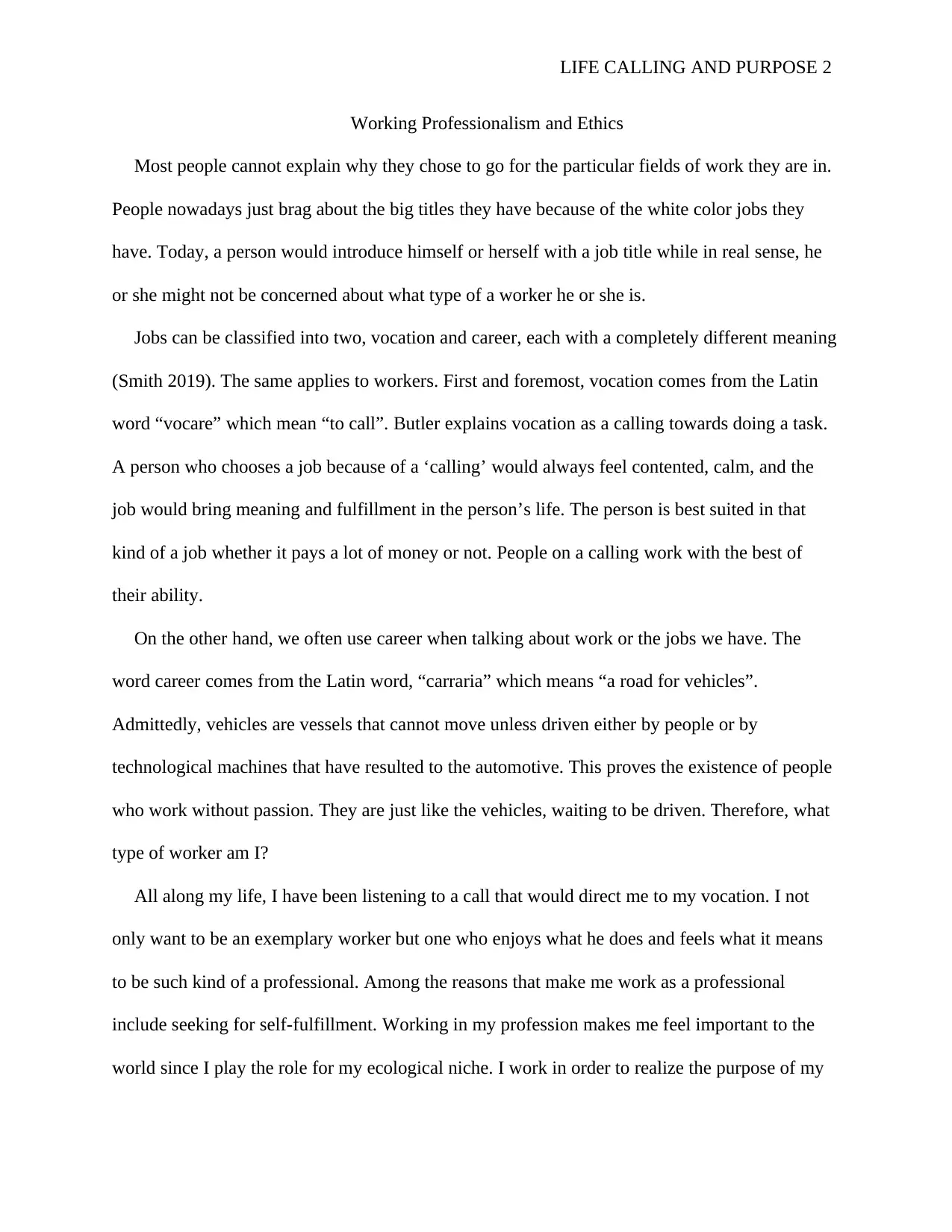
LIFE CALLING AND PURPOSE 2
Working Professionalism and Ethics
Most people cannot explain why they chose to go for the particular fields of work they are in.
People nowadays just brag about the big titles they have because of the white color jobs they
have. Today, a person would introduce himself or herself with a job title while in real sense, he
or she might not be concerned about what type of a worker he or she is.
Jobs can be classified into two, vocation and career, each with a completely different meaning
(Smith 2019). The same applies to workers. First and foremost, vocation comes from the Latin
word “vocare” which mean “to call”. Butler explains vocation as a calling towards doing a task.
A person who chooses a job because of a ‘calling’ would always feel contented, calm, and the
job would bring meaning and fulfillment in the person’s life. The person is best suited in that
kind of a job whether it pays a lot of money or not. People on a calling work with the best of
their ability.
On the other hand, we often use career when talking about work or the jobs we have. The
word career comes from the Latin word, “carraria” which means “a road for vehicles”.
Admittedly, vehicles are vessels that cannot move unless driven either by people or by
technological machines that have resulted to the automotive. This proves the existence of people
who work without passion. They are just like the vehicles, waiting to be driven. Therefore, what
type of worker am I?
All along my life, I have been listening to a call that would direct me to my vocation. I not
only want to be an exemplary worker but one who enjoys what he does and feels what it means
to be such kind of a professional. Among the reasons that make me work as a professional
include seeking for self-fulfillment. Working in my profession makes me feel important to the
world since I play the role for my ecological niche. I work in order to realize the purpose of my
Working Professionalism and Ethics
Most people cannot explain why they chose to go for the particular fields of work they are in.
People nowadays just brag about the big titles they have because of the white color jobs they
have. Today, a person would introduce himself or herself with a job title while in real sense, he
or she might not be concerned about what type of a worker he or she is.
Jobs can be classified into two, vocation and career, each with a completely different meaning
(Smith 2019). The same applies to workers. First and foremost, vocation comes from the Latin
word “vocare” which mean “to call”. Butler explains vocation as a calling towards doing a task.
A person who chooses a job because of a ‘calling’ would always feel contented, calm, and the
job would bring meaning and fulfillment in the person’s life. The person is best suited in that
kind of a job whether it pays a lot of money or not. People on a calling work with the best of
their ability.
On the other hand, we often use career when talking about work or the jobs we have. The
word career comes from the Latin word, “carraria” which means “a road for vehicles”.
Admittedly, vehicles are vessels that cannot move unless driven either by people or by
technological machines that have resulted to the automotive. This proves the existence of people
who work without passion. They are just like the vehicles, waiting to be driven. Therefore, what
type of worker am I?
All along my life, I have been listening to a call that would direct me to my vocation. I not
only want to be an exemplary worker but one who enjoys what he does and feels what it means
to be such kind of a professional. Among the reasons that make me work as a professional
include seeking for self-fulfillment. Working in my profession makes me feel important to the
world since I play the role for my ecological niche. I work in order to realize the purpose of my
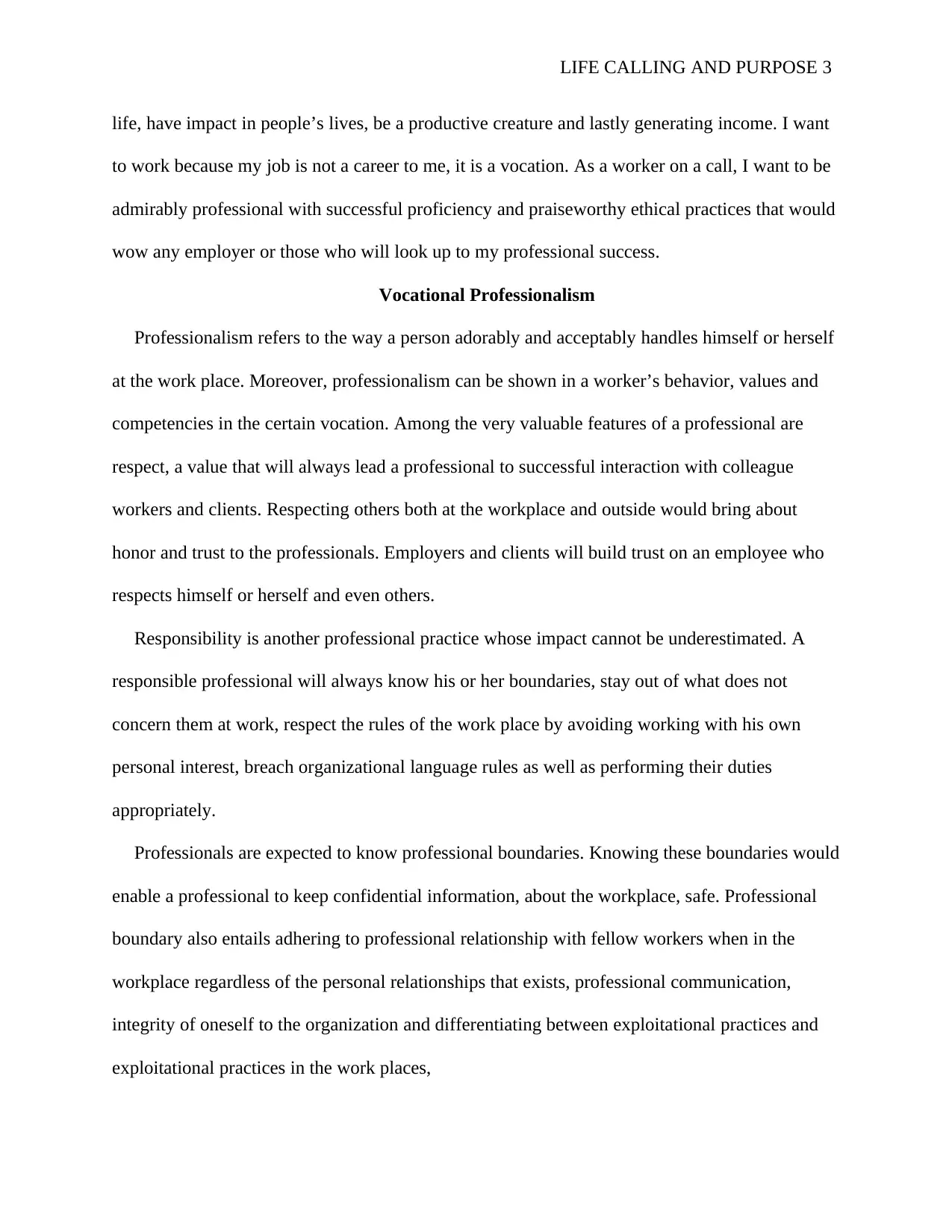
LIFE CALLING AND PURPOSE 3
life, have impact in people’s lives, be a productive creature and lastly generating income. I want
to work because my job is not a career to me, it is a vocation. As a worker on a call, I want to be
admirably professional with successful proficiency and praiseworthy ethical practices that would
wow any employer or those who will look up to my professional success.
Vocational Professionalism
Professionalism refers to the way a person adorably and acceptably handles himself or herself
at the work place. Moreover, professionalism can be shown in a worker’s behavior, values and
competencies in the certain vocation. Among the very valuable features of a professional are
respect, a value that will always lead a professional to successful interaction with colleague
workers and clients. Respecting others both at the workplace and outside would bring about
honor and trust to the professionals. Employers and clients will build trust on an employee who
respects himself or herself and even others.
Responsibility is another professional practice whose impact cannot be underestimated. A
responsible professional will always know his or her boundaries, stay out of what does not
concern them at work, respect the rules of the work place by avoiding working with his own
personal interest, breach organizational language rules as well as performing their duties
appropriately.
Professionals are expected to know professional boundaries. Knowing these boundaries would
enable a professional to keep confidential information, about the workplace, safe. Professional
boundary also entails adhering to professional relationship with fellow workers when in the
workplace regardless of the personal relationships that exists, professional communication,
integrity of oneself to the organization and differentiating between exploitational practices and
exploitational practices in the work places,
life, have impact in people’s lives, be a productive creature and lastly generating income. I want
to work because my job is not a career to me, it is a vocation. As a worker on a call, I want to be
admirably professional with successful proficiency and praiseworthy ethical practices that would
wow any employer or those who will look up to my professional success.
Vocational Professionalism
Professionalism refers to the way a person adorably and acceptably handles himself or herself
at the work place. Moreover, professionalism can be shown in a worker’s behavior, values and
competencies in the certain vocation. Among the very valuable features of a professional are
respect, a value that will always lead a professional to successful interaction with colleague
workers and clients. Respecting others both at the workplace and outside would bring about
honor and trust to the professionals. Employers and clients will build trust on an employee who
respects himself or herself and even others.
Responsibility is another professional practice whose impact cannot be underestimated. A
responsible professional will always know his or her boundaries, stay out of what does not
concern them at work, respect the rules of the work place by avoiding working with his own
personal interest, breach organizational language rules as well as performing their duties
appropriately.
Professionals are expected to know professional boundaries. Knowing these boundaries would
enable a professional to keep confidential information, about the workplace, safe. Professional
boundary also entails adhering to professional relationship with fellow workers when in the
workplace regardless of the personal relationships that exists, professional communication,
integrity of oneself to the organization and differentiating between exploitational practices and
exploitational practices in the work places,
⊘ This is a preview!⊘
Do you want full access?
Subscribe today to unlock all pages.

Trusted by 1+ million students worldwide
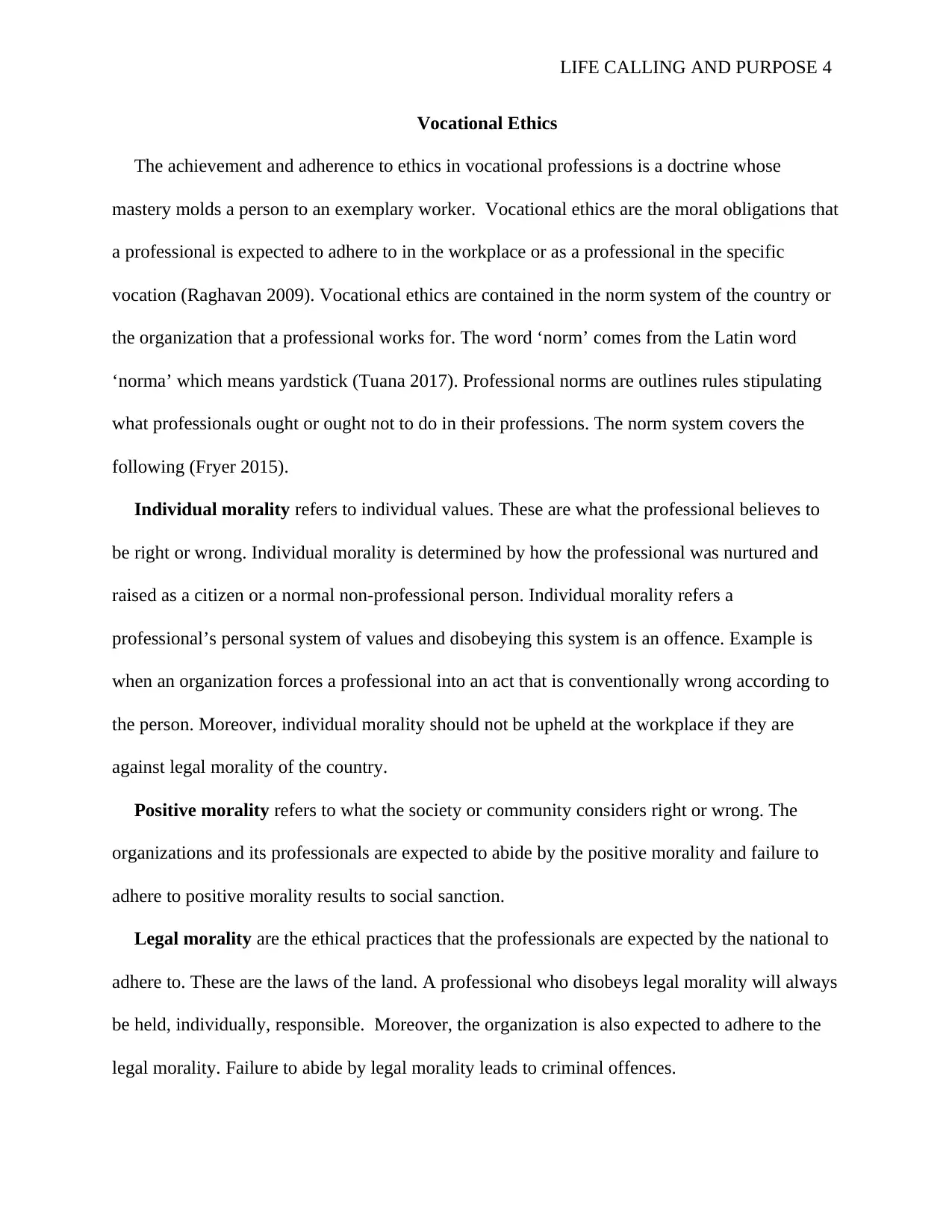
LIFE CALLING AND PURPOSE 4
Vocational Ethics
The achievement and adherence to ethics in vocational professions is a doctrine whose
mastery molds a person to an exemplary worker. Vocational ethics are the moral obligations that
a professional is expected to adhere to in the workplace or as a professional in the specific
vocation (Raghavan 2009). Vocational ethics are contained in the norm system of the country or
the organization that a professional works for. The word ‘norm’ comes from the Latin word
‘norma’ which means yardstick (Tuana 2017). Professional norms are outlines rules stipulating
what professionals ought or ought not to do in their professions. The norm system covers the
following (Fryer 2015).
Individual morality refers to individual values. These are what the professional believes to
be right or wrong. Individual morality is determined by how the professional was nurtured and
raised as a citizen or a normal non-professional person. Individual morality refers a
professional’s personal system of values and disobeying this system is an offence. Example is
when an organization forces a professional into an act that is conventionally wrong according to
the person. Moreover, individual morality should not be upheld at the workplace if they are
against legal morality of the country.
Positive morality refers to what the society or community considers right or wrong. The
organizations and its professionals are expected to abide by the positive morality and failure to
adhere to positive morality results to social sanction.
Legal morality are the ethical practices that the professionals are expected by the national to
adhere to. These are the laws of the land. A professional who disobeys legal morality will always
be held, individually, responsible. Moreover, the organization is also expected to adhere to the
legal morality. Failure to abide by legal morality leads to criminal offences.
Vocational Ethics
The achievement and adherence to ethics in vocational professions is a doctrine whose
mastery molds a person to an exemplary worker. Vocational ethics are the moral obligations that
a professional is expected to adhere to in the workplace or as a professional in the specific
vocation (Raghavan 2009). Vocational ethics are contained in the norm system of the country or
the organization that a professional works for. The word ‘norm’ comes from the Latin word
‘norma’ which means yardstick (Tuana 2017). Professional norms are outlines rules stipulating
what professionals ought or ought not to do in their professions. The norm system covers the
following (Fryer 2015).
Individual morality refers to individual values. These are what the professional believes to
be right or wrong. Individual morality is determined by how the professional was nurtured and
raised as a citizen or a normal non-professional person. Individual morality refers a
professional’s personal system of values and disobeying this system is an offence. Example is
when an organization forces a professional into an act that is conventionally wrong according to
the person. Moreover, individual morality should not be upheld at the workplace if they are
against legal morality of the country.
Positive morality refers to what the society or community considers right or wrong. The
organizations and its professionals are expected to abide by the positive morality and failure to
adhere to positive morality results to social sanction.
Legal morality are the ethical practices that the professionals are expected by the national to
adhere to. These are the laws of the land. A professional who disobeys legal morality will always
be held, individually, responsible. Moreover, the organization is also expected to adhere to the
legal morality. Failure to abide by legal morality leads to criminal offences.
Paraphrase This Document
Need a fresh take? Get an instant paraphrase of this document with our AI Paraphraser
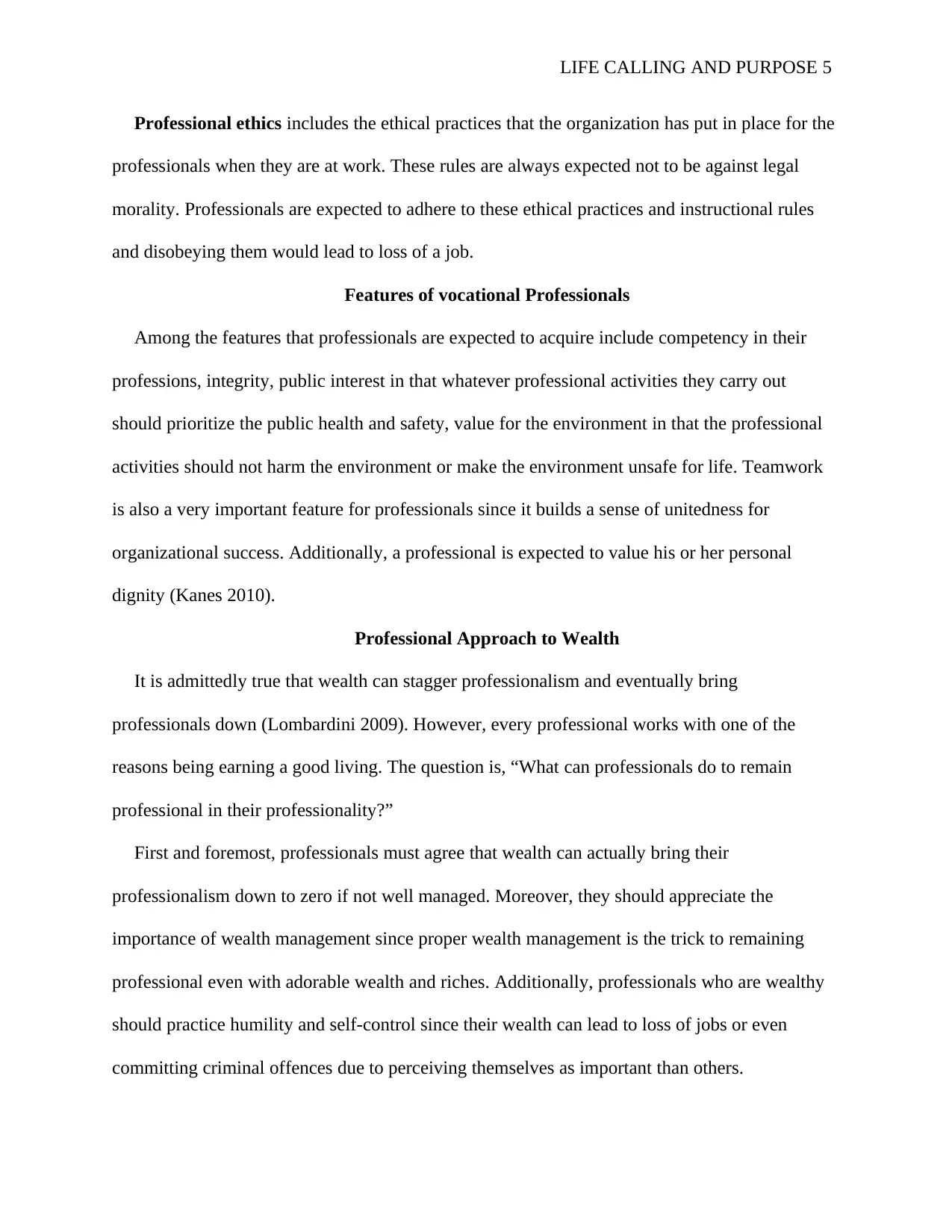
LIFE CALLING AND PURPOSE 5
Professional ethics includes the ethical practices that the organization has put in place for the
professionals when they are at work. These rules are always expected not to be against legal
morality. Professionals are expected to adhere to these ethical practices and instructional rules
and disobeying them would lead to loss of a job.
Features of vocational Professionals
Among the features that professionals are expected to acquire include competency in their
professions, integrity, public interest in that whatever professional activities they carry out
should prioritize the public health and safety, value for the environment in that the professional
activities should not harm the environment or make the environment unsafe for life. Teamwork
is also a very important feature for professionals since it builds a sense of unitedness for
organizational success. Additionally, a professional is expected to value his or her personal
dignity (Kanes 2010).
Professional Approach to Wealth
It is admittedly true that wealth can stagger professionalism and eventually bring
professionals down (Lombardini 2009). However, every professional works with one of the
reasons being earning a good living. The question is, “What can professionals do to remain
professional in their professionality?”
First and foremost, professionals must agree that wealth can actually bring their
professionalism down to zero if not well managed. Moreover, they should appreciate the
importance of wealth management since proper wealth management is the trick to remaining
professional even with adorable wealth and riches. Additionally, professionals who are wealthy
should practice humility and self-control since their wealth can lead to loss of jobs or even
committing criminal offences due to perceiving themselves as important than others.
Professional ethics includes the ethical practices that the organization has put in place for the
professionals when they are at work. These rules are always expected not to be against legal
morality. Professionals are expected to adhere to these ethical practices and instructional rules
and disobeying them would lead to loss of a job.
Features of vocational Professionals
Among the features that professionals are expected to acquire include competency in their
professions, integrity, public interest in that whatever professional activities they carry out
should prioritize the public health and safety, value for the environment in that the professional
activities should not harm the environment or make the environment unsafe for life. Teamwork
is also a very important feature for professionals since it builds a sense of unitedness for
organizational success. Additionally, a professional is expected to value his or her personal
dignity (Kanes 2010).
Professional Approach to Wealth
It is admittedly true that wealth can stagger professionalism and eventually bring
professionals down (Lombardini 2009). However, every professional works with one of the
reasons being earning a good living. The question is, “What can professionals do to remain
professional in their professionality?”
First and foremost, professionals must agree that wealth can actually bring their
professionalism down to zero if not well managed. Moreover, they should appreciate the
importance of wealth management since proper wealth management is the trick to remaining
professional even with adorable wealth and riches. Additionally, professionals who are wealthy
should practice humility and self-control since their wealth can lead to loss of jobs or even
committing criminal offences due to perceiving themselves as important than others.
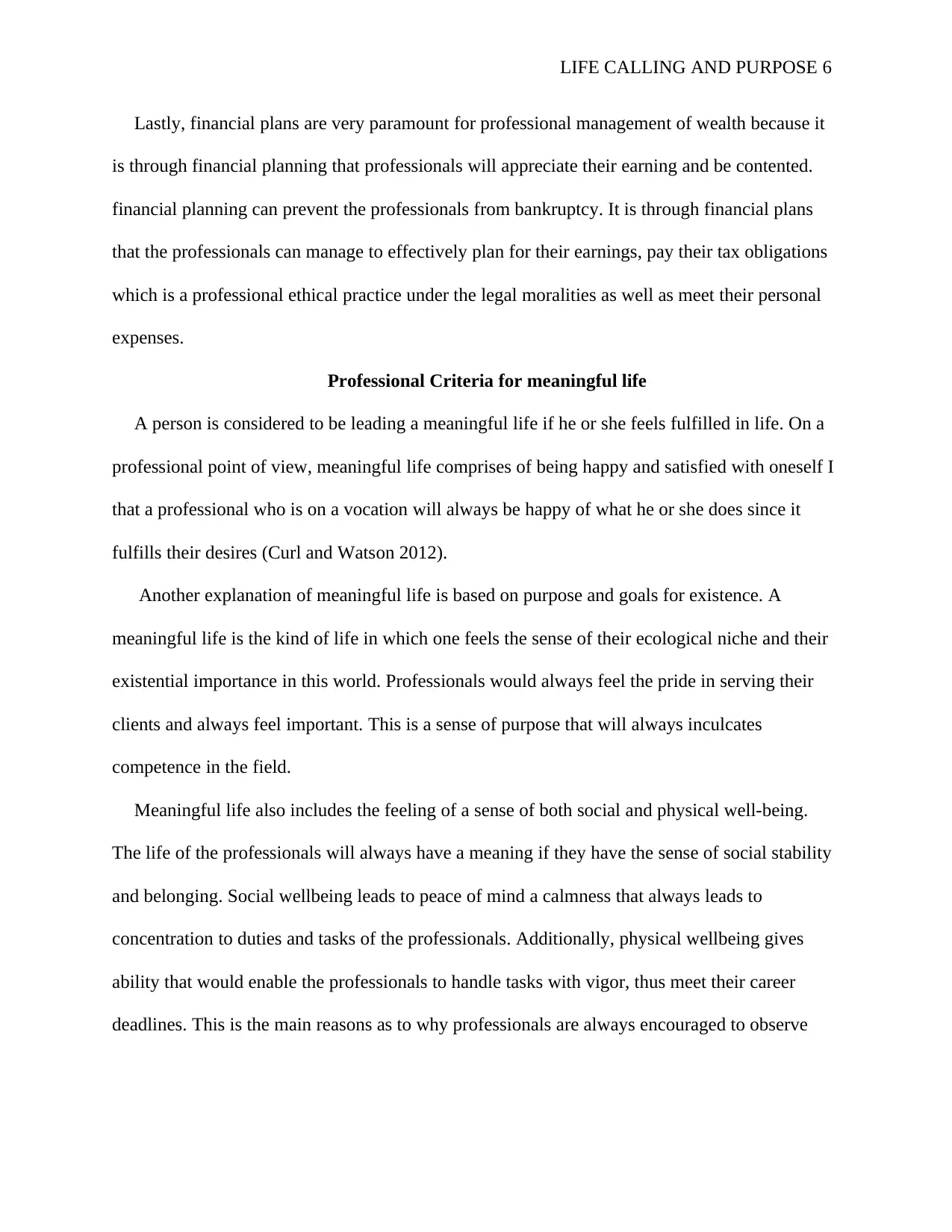
LIFE CALLING AND PURPOSE 6
Lastly, financial plans are very paramount for professional management of wealth because it
is through financial planning that professionals will appreciate their earning and be contented.
financial planning can prevent the professionals from bankruptcy. It is through financial plans
that the professionals can manage to effectively plan for their earnings, pay their tax obligations
which is a professional ethical practice under the legal moralities as well as meet their personal
expenses.
Professional Criteria for meaningful life
A person is considered to be leading a meaningful life if he or she feels fulfilled in life. On a
professional point of view, meaningful life comprises of being happy and satisfied with oneself I
that a professional who is on a vocation will always be happy of what he or she does since it
fulfills their desires (Curl and Watson 2012).
Another explanation of meaningful life is based on purpose and goals for existence. A
meaningful life is the kind of life in which one feels the sense of their ecological niche and their
existential importance in this world. Professionals would always feel the pride in serving their
clients and always feel important. This is a sense of purpose that will always inculcates
competence in the field.
Meaningful life also includes the feeling of a sense of both social and physical well-being.
The life of the professionals will always have a meaning if they have the sense of social stability
and belonging. Social wellbeing leads to peace of mind a calmness that always leads to
concentration to duties and tasks of the professionals. Additionally, physical wellbeing gives
ability that would enable the professionals to handle tasks with vigor, thus meet their career
deadlines. This is the main reasons as to why professionals are always encouraged to observe
Lastly, financial plans are very paramount for professional management of wealth because it
is through financial planning that professionals will appreciate their earning and be contented.
financial planning can prevent the professionals from bankruptcy. It is through financial plans
that the professionals can manage to effectively plan for their earnings, pay their tax obligations
which is a professional ethical practice under the legal moralities as well as meet their personal
expenses.
Professional Criteria for meaningful life
A person is considered to be leading a meaningful life if he or she feels fulfilled in life. On a
professional point of view, meaningful life comprises of being happy and satisfied with oneself I
that a professional who is on a vocation will always be happy of what he or she does since it
fulfills their desires (Curl and Watson 2012).
Another explanation of meaningful life is based on purpose and goals for existence. A
meaningful life is the kind of life in which one feels the sense of their ecological niche and their
existential importance in this world. Professionals would always feel the pride in serving their
clients and always feel important. This is a sense of purpose that will always inculcates
competence in the field.
Meaningful life also includes the feeling of a sense of both social and physical well-being.
The life of the professionals will always have a meaning if they have the sense of social stability
and belonging. Social wellbeing leads to peace of mind a calmness that always leads to
concentration to duties and tasks of the professionals. Additionally, physical wellbeing gives
ability that would enable the professionals to handle tasks with vigor, thus meet their career
deadlines. This is the main reasons as to why professionals are always encouraged to observe
⊘ This is a preview!⊘
Do you want full access?
Subscribe today to unlock all pages.

Trusted by 1+ million students worldwide
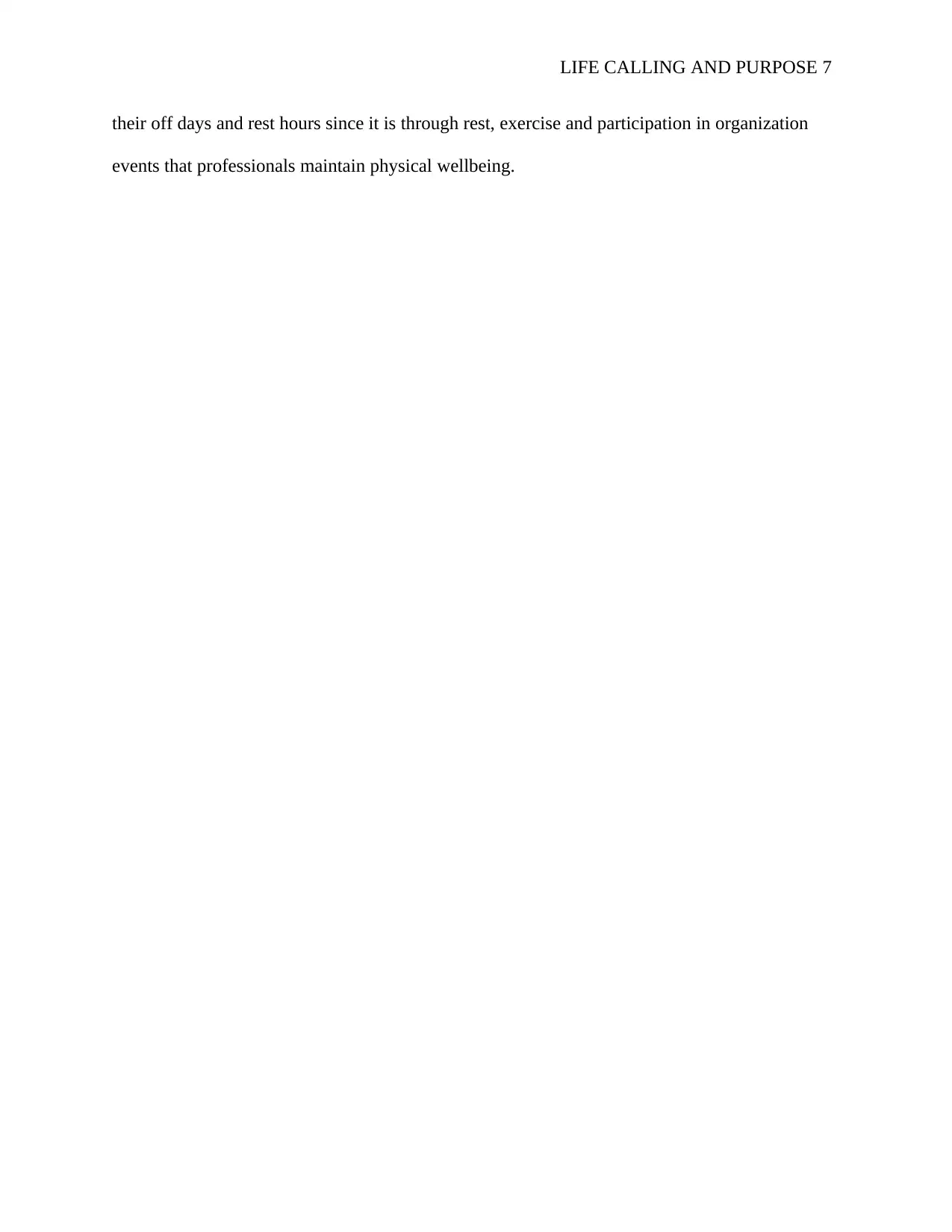
LIFE CALLING AND PURPOSE 7
their off days and rest hours since it is through rest, exercise and participation in organization
events that professionals maintain physical wellbeing.
their off days and rest hours since it is through rest, exercise and participation in organization
events that professionals maintain physical wellbeing.
Paraphrase This Document
Need a fresh take? Get an instant paraphrase of this document with our AI Paraphraser
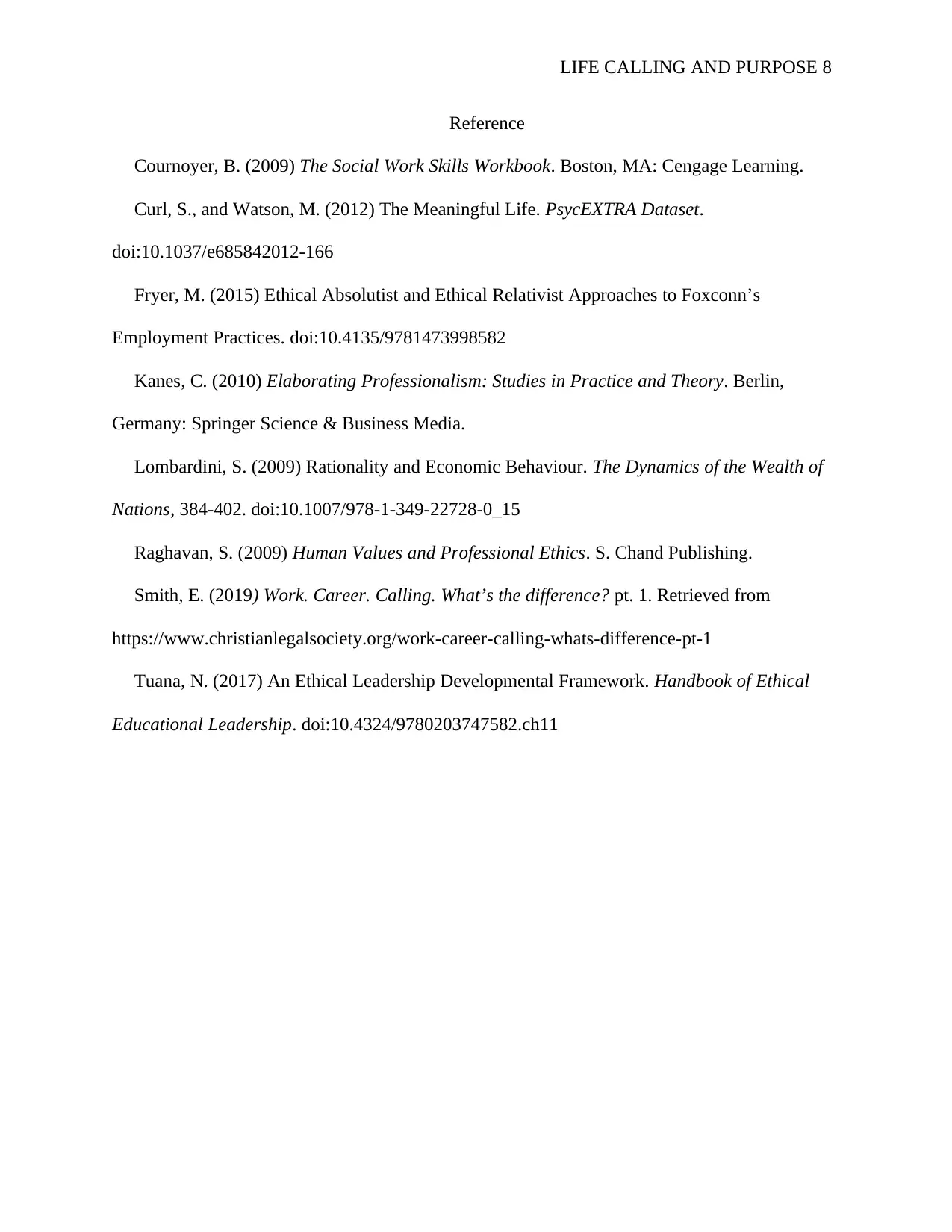
LIFE CALLING AND PURPOSE 8
Reference
Cournoyer, B. (2009) The Social Work Skills Workbook. Boston, MA: Cengage Learning.
Curl, S., and Watson, M. (2012) The Meaningful Life. PsycEXTRA Dataset.
doi:10.1037/e685842012-166
Fryer, M. (2015) Ethical Absolutist and Ethical Relativist Approaches to Foxconn’s
Employment Practices. doi:10.4135/9781473998582
Kanes, C. (2010) Elaborating Professionalism: Studies in Practice and Theory. Berlin,
Germany: Springer Science & Business Media.
Lombardini, S. (2009) Rationality and Economic Behaviour. The Dynamics of the Wealth of
Nations, 384-402. doi:10.1007/978-1-349-22728-0_15
Raghavan, S. (2009) Human Values and Professional Ethics. S. Chand Publishing.
Smith, E. (2019) Work. Career. Calling. What’s the difference? pt. 1. Retrieved from
https://www.christianlegalsociety.org/work-career-calling-whats-difference-pt-1
Tuana, N. (2017) An Ethical Leadership Developmental Framework. Handbook of Ethical
Educational Leadership. doi:10.4324/9780203747582.ch11
Reference
Cournoyer, B. (2009) The Social Work Skills Workbook. Boston, MA: Cengage Learning.
Curl, S., and Watson, M. (2012) The Meaningful Life. PsycEXTRA Dataset.
doi:10.1037/e685842012-166
Fryer, M. (2015) Ethical Absolutist and Ethical Relativist Approaches to Foxconn’s
Employment Practices. doi:10.4135/9781473998582
Kanes, C. (2010) Elaborating Professionalism: Studies in Practice and Theory. Berlin,
Germany: Springer Science & Business Media.
Lombardini, S. (2009) Rationality and Economic Behaviour. The Dynamics of the Wealth of
Nations, 384-402. doi:10.1007/978-1-349-22728-0_15
Raghavan, S. (2009) Human Values and Professional Ethics. S. Chand Publishing.
Smith, E. (2019) Work. Career. Calling. What’s the difference? pt. 1. Retrieved from
https://www.christianlegalsociety.org/work-career-calling-whats-difference-pt-1
Tuana, N. (2017) An Ethical Leadership Developmental Framework. Handbook of Ethical
Educational Leadership. doi:10.4324/9780203747582.ch11
1 out of 8
Related Documents
Your All-in-One AI-Powered Toolkit for Academic Success.
+13062052269
info@desklib.com
Available 24*7 on WhatsApp / Email
![[object Object]](/_next/static/media/star-bottom.7253800d.svg)
Unlock your academic potential
Copyright © 2020–2026 A2Z Services. All Rights Reserved. Developed and managed by ZUCOL.





